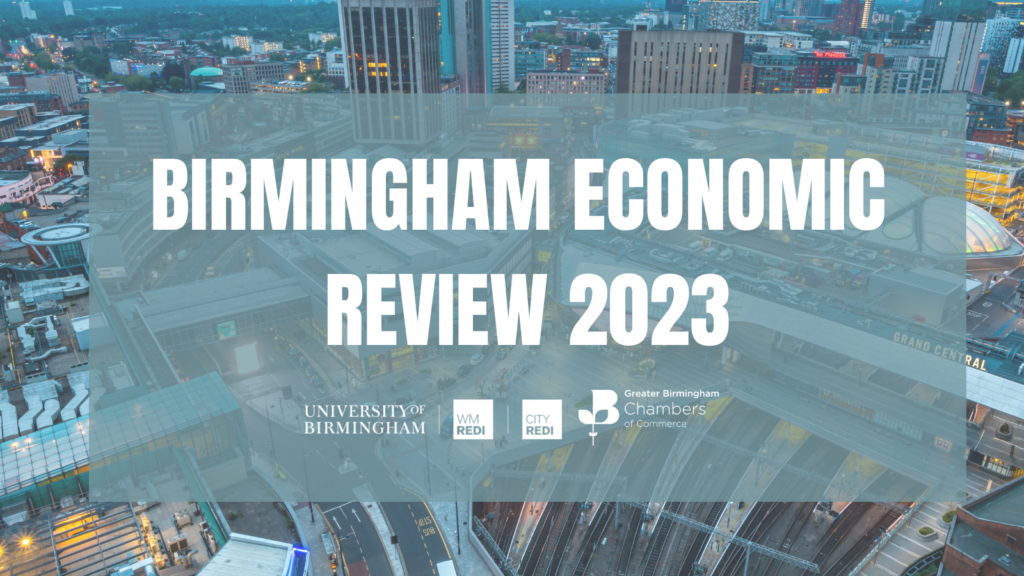
Alice Pugh and Emily Stubbs discuss this year’s Birmingham Economic Review (BER) produced in partnership between City REDI/ WMREDI and the Greater Birmingham Chambers of Commerce, which provides a comprehensive analysis of the Greater Birmingham city region economy.
The review highlights a distinct period of uncertainty that the city-region is experiencing, with ongoing high inflation, high interest rates, labour market pressures and political turbulence. However, it also highlights the opportunities for growth and innovation that are available to the city region. Below is a brief highlight of the contents of the BER:
Economic Turbulence Continues to Challenge Individuals and Businesses
- Pressure to raise prices: in Quarter 2 (Q2) 2023, 45% of Greater Birmingham businesses expected their prices to rise over the next 3 months, however, 53% expected prices to stabilise – marking the first time since Q3 2021 that more firms expected prices to remain the same than to increase.
- The cost of living crisis continues: the Organisation for Economic Co-operation and Development expects UK inflation to average 7.2% in 2023, mainly driven by increases in the costs of energy and food. This is the highest rate in the G7 and the third highest in the G20.
- Interest rates increase: the Bank of England raised interest rates 14 consecutive times between December 2021 and August 2023 to curb spending and bring inflation down to its 2% target, severely impacting mortgages and rental prices. At the time of writing interest rates have now stabilised at 5.25%. The Bank has warned that rates will remain high for at least 2 years.
- Businesses remain confident: in Q2 2023, 65% of Greater Birmingham firms anticipated an increase in their turnover in the following 12 months and 58% expected an increase in profitability over the next year.

Population: A Young and Diverse City
- Young and diverse: more than 1 in 5 Birmingham residents are aged 0-15, and almost 1 in 3 are members of an ethnic minority.
- Skill attainment remains below average: 10.9% of economically active people aged 16 and over in Greater Birmingham have no qualifications, compared to 8.9% across England. The city region also has a shortfall in residents with NVQ Level 4+ qualifications – 38.7%, compared to 42.0% nationally. However, compared to pre-pandemic qualification rates from NVQ Level 1 to 4+ have improved in the city-region.
- A rise in economic inactivity contributes to tight labour markets: economic inactivity in the city region rose from 2020 to 29.2% in 2022. Looking after a family/home accounted for 0.9% more cases in Greater Birmingham in 2022 compared to 2021, likely due to an estimated 16% increase in childcare costs nationally.
- High levels of deprivation: Birmingham is ranked as the 7th most deprived local authority in England and this remains unchanged since 2015.

Connecting The City with New Opportunities
- High Speed 2: construction of HS2 between Birmingham and Euston is well underway, and it is anticipated that the first HS2 services will run between Birmingham Curzon Street and Old Oak Common in London between 2029 and 2033.
- Deeper Devolution: the WMCA has negotiated a Deeper Devolution deal which will offer wide-ranging new powers and an expected budget windfall of in excess of £1.5bn to level up the region.
- Innovation in the business support landscape: ‘Business Growth West Midlands’ and a new, West Midlands Innovation Accelerator programme have been launched to support business scale-up and growth in the region.
- The largest share of Foreign Direct Investment (FDI) of all UK regions outside London: the West Midlands recorded 181 FDI projects in 2022/23, an increase of 171% since 2021/22, with overseas investors creating 8,252 jobs – a 48% increase compared to 2021/22. The Birmingham 2022 Commonwealth Games Business and Tourism Programme played a key role in this.
- Record visitor numbers: in the year of the Games, 141.2m visitors came to the West Midlands – a 38% increase since 2021 and a 5% increase compared to 2019. Spending by visitors rose to £14.1bn, a 39% increase since 2021 and a 7% increase compared to 2019.
Read the Birmingham Economic Review in full.
This blog was written by Alice Pugh, Policy and Data Analyst, City-REDI / WMREDI, University of Birmingham and Emily Stubbs, Senior Policy and Projects Manager at Greater Birmingham Chambers of Commerce.
Disclaimer:
The views expressed in this analysis post are those of the authors and not necessarily those of City-REDI, WMREDI or the University of Birmingham.
